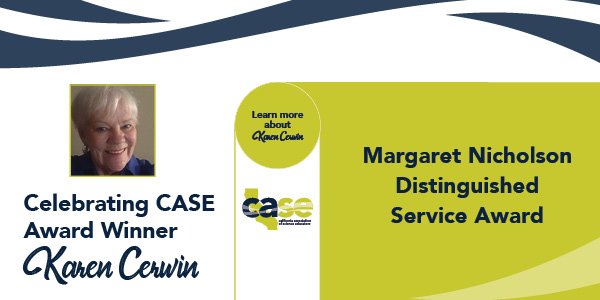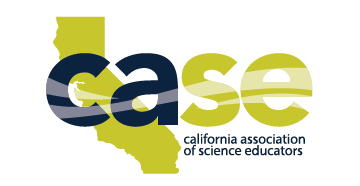
Karen Cerwin
2020 Award Winner
Margaret Nicholson Distinguished Service Award:
Karen Cerwin

What does being a CASE member and advocate mean to you?
CASE membership provides opportunities for a variety of levels of science advocacy and a platform for developing leadership within a classroom, school, district, or statewide. Classroom teachers may begin with CASE on-line resources and the CASE conference as a way to enhance their practice and collaborate with other teachers. This collaboration often leads to opportunities within CASE for expanding teacher leadership by presenting at the conference or volunteering for a variety of tasks and roles that promote science K-12 in California. All teachers of science benefit from working together for the higher cause of providing access and equity to science for all students in California. CASE is a consistent forum for this work.
What do you think the future holds for K-12 Alliance?
K-12 Alliance has always been a “think tank” of inclusive collaborators designing learning opportunities that model best practices for both adult learning and student learning.
The vision for the K-12 Alliance network is to provide long-term professional learning for teachers and administrators supported by network leaders. Collaboration and continuous learning are hallmarks of the organization and are currently meeting today’s challenges of online learning as well as preparing for future challenges to make science a reality for all California students. There is much work to do to meet this goal and the best people to do the work are teachers passionate about access and equity for all students. While the funding sources have changed many times through the 33 years of K-12 Alliance, resources follow good work and good ideas.
What would you recommend for others to do to find inspiration and encouragement to keep growing in their career?
I suggest linking with an organization such as CASE, K-12 Alliance or the California Science Project. Organizations provide contacts with other “continuous learners” and opportunities to learn and be mentored by other teacher leaders. In addition, volunteer to take on a challenge at your school or district even when you know you don’t have all the answers to the challenge. Learning will be exponential for you and connect you with others trying to improve personal teaching practice or school wide teaching improvement. Finally, interview students through verbal questions or notebooking entries to figure out what they are thinking. Once trust is developed, students will tell you what helps them learn, what scares them and what they think they understand. Then you can adjust instruction and truly become a professional teacher.
Why are you passionate about science education?
Early in my career as a teacher, I observed young learners and realized that being engaged in learning allowed learners to overcome gaps in their ability to read and write. Learning takes perseverance and high levels of engagement for success. Science provides the engagement.
Early learning seems to always include “Can Johnnie Read”? I believe the real question is - “Does Johnnie have something urgent to figure out by reading”?
As an example, last year during a lesson study, a fifth grade student started drawing pictures (models) and writing words and phrases to figure out how air might be changing when compressed. After the lesson, his teacher asked me how I “made” him write as he refuses to write in class. I replied that he wrote and drew on his own in order to remember his observations. This is an example of the power of engagement and motivation to “figure out” the science and practice authentic writing.
As educators we can’t wait for Johnnie to read before allowing science instruction. It is the exact opposite. Use science to provide the need to read and write.
How has COVID changed your outlook on science education?
There are three challenges including online teaching and learning, gaps of access for students, and lack of scientific literacy about viruses and vaccinations.
Science instruction during Covid requires innovative ways to make sure science is NGSS and uses investigations. Many teachers are meeting this challenge by sending home materials, designing instruction using household materials or using outdoor spaces. This is a huge challenge and teachers out in front today are modeling how to accomplish high quality science remotely.
Covid 19 has revealed gaps of access and equity for many students and the gap is increasing as time goes on. This challenge is being worked on across the nation and is likely leading to online access for all.
The science behind Covid 19 and even beliefs about vaccinations are examples of a lack of scientific literacy by large numbers of people. This lack of science understanding demands “NGSS for all” to meet the goal of scientific literacy for decision making at all levels.
Quick Links
Exhibit Partner Package
Opening Soon
Join us at the 2025 California Science Education Conference, the premier event for science educators across California! This gathering is your chance to showcase your products, engage with educators, and maximize your impact through our exclusive Partner Program.

